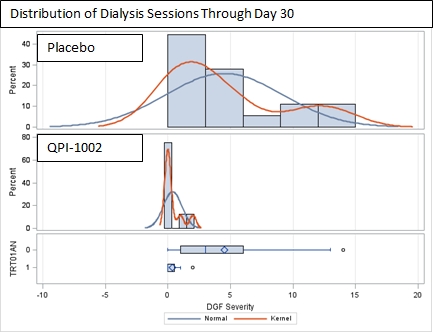QPI-1002, a siRNA Targeting p53: Improvement in Outcomes Following Acute Kidney Injury (AKI): Cardiac Surgery to AKI Donors
1Quark Pharmaceuticals, Fremont
2McGill University Health, Montreal, Canada
3Wake Forest School of Medicine Centre, Winston-Salem.
Meeting: 2018 American Transplant Congress
Abstract number: 198
Keywords: Apoptosis, Donors, Kidney transplantation, marginal, Renal injury
Session Information
Session Name: Concurrent Session: Ischemia Reperfusion Injury: Time to Change the Paradigm?
Session Type: Concurrent Session
Date: Monday, June 4, 2018
Session Time: 2:30pm-4:00pm
 Presentation Time: 2:42pm-2:54pm
Presentation Time: 2:42pm-2:54pm
Location: Room 6B
Background: QPI-1002 has been observed to statistically reduce the incidence, severity and duration of AKI in a large Phase 2 study of AKI following cardiac surgery (NCT02610283, J Am Soc Nephrol 28: 2017;1234). The shortage of deceased donor organs has led to the increased use of marginal kidneys including older donors and donors with AKI (defined as a terminal serum creatinine (sCr) ≥ 2.0 mg/dl). Several centers have reported excellent outcomes with AKI donor kidneys in spite of an increased risk of delayed graft function (DGF) (Heilman et al. AJT. 2015;15:2143-51; Farney et al J Am Coll Surg. 2013; 216:645-55). Methods: QPI-1002 has been evaluated in a large Phase 2 study for the prevention of DGF (QRK 006b (NCT# 00802347); [Peddi et al AJT 2014;14 (suppl 3):153 (Abstract #2967); Squiers E et al, AJT 2015;15(suppl 3) (Abstract #448)]. QPI-1002 reduced the severity of DGF in donors age >45. The current analysis looks at the subset of donors from the QRK006B study with donor age was >45 and sCr ≥ 2.0 mg/dl. A negative binomial model was used to determine DGF severity difference between groups. Results: There were a total of 26 kidney transplants performed from AKI donors > age 45 (8 QPI-1002,18 Placebo). Demographics were similar between groups, with donor age 57±9 years and terminal sCr 2.9 ± 1.1 mg/dl (QPI-1002) and 54±5 and 2.1±0.6, respectively (Placebo). The difference between the QPI-1002 and Placebo groups in DGF incidence (dialysis in the first week post-transplant) and DGF severity (defined as the number of dialysis sessions in the first 30 days for subjects with DGF) was statistically significant, with p=0.0077 and p = 0.0006, respectively; and a mean DGF severity of 0.38±0.7 days (QPI-1002) and 4.5 ±4.6 (Placebo). Distribution of dialysis days is graphically displayed below.  Conclusions: QPI-1002 may reduce DGF incidence and severity in AKI kidneys from donors >age 45. A Phase 3 study of QPI-1002 in DGF in donors >age 45 (ReGIFT Study, NCT#02610296) is ongoing.
Conclusions: QPI-1002 may reduce DGF incidence and severity in AKI kidneys from donors >age 45. A Phase 3 study of QPI-1002 in DGF in donors >age 45 (ReGIFT Study, NCT#02610296) is ongoing.
CITATION INFORMATION: Tchervenkov J., Squiers E., Stratta R., Odenheimer D., Rothenstein D., QPI-1002 DGF Study Group QPI-1002, a siRNA Targeting p53: Improvement in Outcomes Following Acute Kidney Injury (AKI): Cardiac Surgery to AKI Donors Am J Transplant. 2017;17 (suppl 3).
To cite this abstract in AMA style:
Tchervenkov J, Squiers E, Stratta R, Odenheimer D, Rothenstein D, Group QPI-1002DGFStudy. QPI-1002, a siRNA Targeting p53: Improvement in Outcomes Following Acute Kidney Injury (AKI): Cardiac Surgery to AKI Donors [abstract]. https://atcmeetingabstracts.com/abstract/qpi-1002-a-sirna-targeting-p53-improvement-in-outcomes-following-acute-kidney-injury-aki-cardiac-surgery-to-aki-donors/. Accessed February 20, 2026.« Back to 2018 American Transplant Congress
